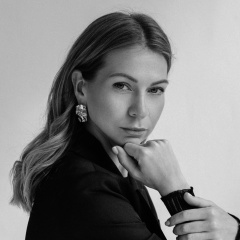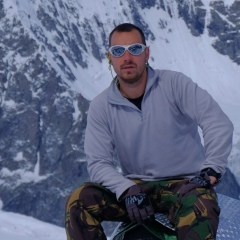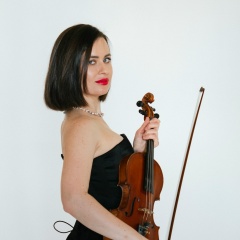О РУССКОМ ВОПРОСЕ.
Заметки о встрече в Московском Доме Национальностей
Вчера, 17 декабря, в Московском доме национальностей (МДН) прошла творческая встреча с писателем Ю.М. Поляковым. Поводом послужил выход его новой книги "Желание быть русским", за которую он уже успел пострадать (по общественной линии).
МДН озадачил: на размещённом на его сайте объявлении говорилось, что начало встречи - в 17.00, и тут же пояснялось: "сбор гостей с 18.30". Ответственная за мероприятие женщина к телефону не подходила... Но на что тогда русскому человеку смекалка?
Но я о другом. К сожалению, как-то вышло так, что о русских и "русском вопросе" (то есть, о самом поводе встречи) говорилось меньше, чем о положении других народов и их культур (литературы). Сложилось впечатление, что и Поляков, и его гости как бы оправдывались, что поднимают ТАКОЙ вопрос, и как бы защищались тем, что они "не против других".
Разумеется, и они, и все прочие, у кого душа болит за русских, не против кого-то. Они за свой народ - народ, на котором держится страна и без которого она разлетится на куски. Но раз уж подняли такой вопрос, то и надо говорить о положении и самочувствии именно русских!
У других народов свои защитники и печальники найдутся - сама постсоветская российская государственность им в помощь. А вот у русских таких, как уже давно выяснилось, нет. Об этом Поляков и его гости упоминали - но вскользь. Да и вообще, сказавши "а" (то есть, обрисовав положение, в котором пребывает народ), надо сказать и "б" - то есть, назвать причины, почему же он, его культура, язык и т.п. находятся в таком положении. Показалось, что и сам писатель, и его коллеги это понимают, но прямо не говорят, ограничиваясь риторическими вопросами. А жаль.
И ещё. Выступавшая К. Геворкян сказала, что не может согласиться с утверждением (приведя в пример М. Шевченко), что русские - это европейцы. "А как же татары и якуты? - вопрошала она. - Как быть с Азией?". То есть, мы (очевидно, россияне) - евроазиаты, и Азия нам должна быть столь же близка (или того больше), чем Европа.
Да, мы - не "Европа" в узком смысле этого слова. Но мы тем более и не "Азия". Россия расположена на Евразийском материке, в ней проживают разные народы, в том числе азиатские. Но это не значит, что Россия - это некая "Евразия". Как бы ни старались евразийцы и адепты "новой исторической общности - российской нации", Азия нам очень далека. Россию сделали и делают именно "Россией" русские. А русские - европейский народ (в широком смысле этого слова, не путать с Европой политической) - и расово, и культурно, и конфессионально, и исторически. Европейский народ, живущий в Евразии. А вернее, в России.
А МДН спасибо за мероприятие. И его участникам - тоже.
Заметки о встрече в Московском Доме Национальностей
Вчера, 17 декабря, в Московском доме национальностей (МДН) прошла творческая встреча с писателем Ю.М. Поляковым. Поводом послужил выход его новой книги "Желание быть русским", за которую он уже успел пострадать (по общественной линии).
МДН озадачил: на размещённом на его сайте объявлении говорилось, что начало встречи - в 17.00, и тут же пояснялось: "сбор гостей с 18.30". Ответственная за мероприятие женщина к телефону не подходила... Но на что тогда русскому человеку смекалка?
Но я о другом. К сожалению, как-то вышло так, что о русских и "русском вопросе" (то есть, о самом поводе встречи) говорилось меньше, чем о положении других народов и их культур (литературы). Сложилось впечатление, что и Поляков, и его гости как бы оправдывались, что поднимают ТАКОЙ вопрос, и как бы защищались тем, что они "не против других".
Разумеется, и они, и все прочие, у кого душа болит за русских, не против кого-то. Они за свой народ - народ, на котором держится страна и без которого она разлетится на куски. Но раз уж подняли такой вопрос, то и надо говорить о положении и самочувствии именно русских!
У других народов свои защитники и печальники найдутся - сама постсоветская российская государственность им в помощь. А вот у русских таких, как уже давно выяснилось, нет. Об этом Поляков и его гости упоминали - но вскользь. Да и вообще, сказавши "а" (то есть, обрисовав положение, в котором пребывает народ), надо сказать и "б" - то есть, назвать причины, почему же он, его культура, язык и т.п. находятся в таком положении. Показалось, что и сам писатель, и его коллеги это понимают, но прямо не говорят, ограничиваясь риторическими вопросами. А жаль.
И ещё. Выступавшая К. Геворкян сказала, что не может согласиться с утверждением (приведя в пример М. Шевченко), что русские - это европейцы. "А как же татары и якуты? - вопрошала она. - Как быть с Азией?". То есть, мы (очевидно, россияне) - евроазиаты, и Азия нам должна быть столь же близка (или того больше), чем Европа.
Да, мы - не "Европа" в узком смысле этого слова. Но мы тем более и не "Азия". Россия расположена на Евразийском материке, в ней проживают разные народы, в том числе азиатские. Но это не значит, что Россия - это некая "Евразия". Как бы ни старались евразийцы и адепты "новой исторической общности - российской нации", Азия нам очень далека. Россию сделали и делают именно "Россией" русские. А русские - европейский народ (в широком смысле этого слова, не путать с Европой политической) - и расово, и культурно, и конфессионально, и исторически. Европейский народ, живущий в Евразии. А вернее, в России.
А МДН спасибо за мероприятие. И его участникам - тоже.
ABOUT RUSSIAN QUESTION.
Notes on the meeting at the Moscow House of Nationalities
Yesterday, December 17, in the Moscow House of Nationalities (MDN) there was a creative meeting with the writer Yu.M. Polyakov. The reason was the release of his new book, "Desire to be Russian," for which he had already suffered (on a public line).
MDN was puzzled: the announcement posted on its website said that the meeting would begin at 17.00, and it was immediately explained: "gathering guests from 18.30." The woman responsible for the event didn’t answer the phone ... But then, what was the Russian person smart about?
But I'm talking about something else. Unfortunately, somehow it turned out that less was said about the Russians and the “Russian question” (that is, about the occasion of the meeting) than about the situation of other peoples and their cultures (literature). It seemed that both Polyakov and his guests justified themselves as if they were raising such an issue, and as if defended themselves by the fact that they were "not against others."
Of course, they, and all the others, whose soul hurts for the Russians, are not against anyone. They are for their people - the people on which the country rests and without which it will fall apart. But since such a question was raised, then it is necessary to talk about the situation and well-being of the Russians!
Other peoples have their own defenders and sadnesses - the post-Soviet Russian statehood itself will help them. But the Russians, as it has long been found out, do not. This Polyakov and his guests mentioned - but in passing. And indeed, having said “a” (that is, having outlined the situation in which the people are), it is necessary to say “b” - that is, to name the reasons why he, his culture, language, etc. are in that position. It seemed that both the writer himself and his colleagues understand this, but do not directly speak, confining themselves to rhetorical questions. It's a pity.
And further. Speaker K. Gevorgyan said she could not agree with the statement (citing M. Shevchenko as an example) that the Russians are Europeans. “But what about the Tatars and the Yakuts?” She asked. “What about Asia?” That is, we (obviously Russians) are Euro-Asians, and Asia should be as close to us (or even more so) than Europe.
Yes, we are not "Europe" in the narrow sense of the word. But we are all the more not Asia. Russia is located on the Eurasian continent, different peoples live in it, including Asian. But this does not mean that Russia is a kind of “Eurasia”. No matter how hard the Eurasians and adherents of the “new historical community - the Russian nation” try, Asia is very far from us. Russia has made and is exactly what Russians are doing. And the Russians are the European people (in the broad sense of the word, not to be confused with political Europe) - both racially, culturally, and confessionally, and historically. European people living in Eurasia. Or rather, in Russia.
Thanks MDN for the event. And its participants too.
Notes on the meeting at the Moscow House of Nationalities
Yesterday, December 17, in the Moscow House of Nationalities (MDN) there was a creative meeting with the writer Yu.M. Polyakov. The reason was the release of his new book, "Desire to be Russian," for which he had already suffered (on a public line).
MDN was puzzled: the announcement posted on its website said that the meeting would begin at 17.00, and it was immediately explained: "gathering guests from 18.30." The woman responsible for the event didn’t answer the phone ... But then, what was the Russian person smart about?
But I'm talking about something else. Unfortunately, somehow it turned out that less was said about the Russians and the “Russian question” (that is, about the occasion of the meeting) than about the situation of other peoples and their cultures (literature). It seemed that both Polyakov and his guests justified themselves as if they were raising such an issue, and as if defended themselves by the fact that they were "not against others."
Of course, they, and all the others, whose soul hurts for the Russians, are not against anyone. They are for their people - the people on which the country rests and without which it will fall apart. But since such a question was raised, then it is necessary to talk about the situation and well-being of the Russians!
Other peoples have their own defenders and sadnesses - the post-Soviet Russian statehood itself will help them. But the Russians, as it has long been found out, do not. This Polyakov and his guests mentioned - but in passing. And indeed, having said “a” (that is, having outlined the situation in which the people are), it is necessary to say “b” - that is, to name the reasons why he, his culture, language, etc. are in that position. It seemed that both the writer himself and his colleagues understand this, but do not directly speak, confining themselves to rhetorical questions. It's a pity.
And further. Speaker K. Gevorgyan said she could not agree with the statement (citing M. Shevchenko as an example) that the Russians are Europeans. “But what about the Tatars and the Yakuts?” She asked. “What about Asia?” That is, we (obviously Russians) are Euro-Asians, and Asia should be as close to us (or even more so) than Europe.
Yes, we are not "Europe" in the narrow sense of the word. But we are all the more not Asia. Russia is located on the Eurasian continent, different peoples live in it, including Asian. But this does not mean that Russia is a kind of “Eurasia”. No matter how hard the Eurasians and adherents of the “new historical community - the Russian nation” try, Asia is very far from us. Russia has made and is exactly what Russians are doing. And the Russians are the European people (in the broad sense of the word, not to be confused with political Europe) - both racially, culturally, and confessionally, and historically. European people living in Eurasia. Or rather, in Russia.
Thanks MDN for the event. And its participants too.

У записи 4 лайков,
0 репостов,
114 просмотров.
0 репостов,
114 просмотров.
Эту запись оставил(а) на своей стене Андрей Марчуков
























